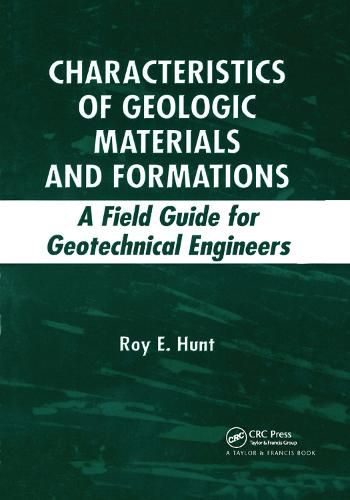Readings Newsletter
Become a Readings Member to make your shopping experience even easier.
Sign in or sign up for free!
You’re not far away from qualifying for FREE standard shipping within Australia
You’ve qualified for FREE standard shipping within Australia
The cart is loading…






Properly understanding and characterizing geologic materials and formations is vital for making critical engineering decisions. Identifying and classifying rock masses and soil formations allows reasonable estimation of their characteristic properties. Comprising chapters from the second edition of the revered Geotechnical Engineering Investigation Handbook, Characteristics of Geologic Materials and Formations provides a basis for recognizing, identifying, and classifying the various rock and soil types.
With clear, concise, and hands-on guidance, this book describes these rock and soil types in terms of their origin, mode of occurrence, and structural features in situ and presents the typical characteristics that are of engineering significance. It also explains the elements that affect surface and subsurface water engineering in terms of controlling floods, erosion, subsurface flow, and seepage, as well as for water conservation. Supplying important correlations used to estimate engineering and geologic properties, the book presents correlations for intact rock, rock masses, and soil formations throughout the chapters and condenses this information into a convenient summary table in an appendix.
Eliminate the need to search through narrow volumes or large handbooks with Characteristics of Geologic Materials and Formations: A Field Guide for Geotechnical Engineers, a convenient and complete guide to the techniques you need.
$9.00 standard shipping within Australia
FREE standard shipping within Australia for orders over $100.00
Express & International shipping calculated at checkout
Properly understanding and characterizing geologic materials and formations is vital for making critical engineering decisions. Identifying and classifying rock masses and soil formations allows reasonable estimation of their characteristic properties. Comprising chapters from the second edition of the revered Geotechnical Engineering Investigation Handbook, Characteristics of Geologic Materials and Formations provides a basis for recognizing, identifying, and classifying the various rock and soil types.
With clear, concise, and hands-on guidance, this book describes these rock and soil types in terms of their origin, mode of occurrence, and structural features in situ and presents the typical characteristics that are of engineering significance. It also explains the elements that affect surface and subsurface water engineering in terms of controlling floods, erosion, subsurface flow, and seepage, as well as for water conservation. Supplying important correlations used to estimate engineering and geologic properties, the book presents correlations for intact rock, rock masses, and soil formations throughout the chapters and condenses this information into a convenient summary table in an appendix.
Eliminate the need to search through narrow volumes or large handbooks with Characteristics of Geologic Materials and Formations: A Field Guide for Geotechnical Engineers, a convenient and complete guide to the techniques you need.